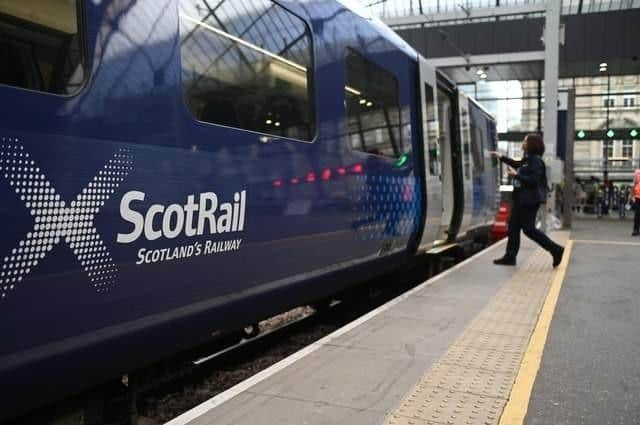Scotrail: what is company’s train driver salary, why is there a dispute over pay, and strike action explained
and live on Freeview channel 276
Train services have been plagued with cancellations in recent weeks due to staff shortages.
The disruptions began on 8 May when drivers opted to not work overtime.
Advertisement
Hide AdAdvertisement
Hide AdThe timetable usually runs approximately 2,150 weekday services. However, starting this week the services have been reduced by a third to 1,456 services.


So, why is there a dispute between Scotrail and train drivers?
Here’s everything you need to know about the action.
Why is there a strike?
The strike comes after a pay dispute between Aslef union and ScotRail.
Scotrail addressed the disruption on their website:
“We’ve been relying on drivers working overtime or on their rest days to run a normal timetable, as the pandemic meant that training new drivers was significantly delayed.”
Advertisement
Hide AdAdvertisement
Hide Ad“Without COVID and that impact on training, we would have trained around an extra 130 drivers today.
“Following an announcement by the drivers’ union ASLEF that it will ballot for industrial action over pay, a significant number of drivers have been declining to make themselves available for overtime or rest day working.
“This has resulted in the recent disruption and our need to introduce a temporary timetable going forward.”
Why is there a dispute over pay rise?
It has been reported that drivers initially wanted a 10% pay increase, and job stability following on from COVID uncertainty.
ScotRail responded by offering a 2.2% which Aslef rejected.
Advertisement
Hide AdAdvertisement
Hide AdAslef’s Scottish organiser, Kevin Lindsay, wrote to Nicola Sturgeon on Monday urging her to intervene in the ‘shambolic’ pay talks: “A 2.2% pay increase (offered verbally not in writing) at a time when inflation is nearing 10% is a significant real-terms pay cut.”
He added: “It is neither fair nor reasonable to expect train drivers, or indeed any worker, to accept such a cut in their pay at the same time as their cost of living is soaring.”
Aslef is preparing to ballot its members in early June to seek approval for industrial action, including an all-out strike, to improve the pay offer.
David Simpson, the ScotRail service delivery director, told the BBC that a compromise would need to be reached on both sides, saying: “We need to sit down and talk against the background where everyone is clear there will need to be a compromise,”
Advertisement
Hide AdAdvertisement
Hide AdAdding that: “The demands of 10% to 11% are just not sustainable in the current economic climate with the railway.
“We need to find a way around that, we need to recognise the kind of demands the unions are making but also the need to demonstrate taxpayer value” he said.
What is the company’s salary for train driver’s?
Salaries can differ between workers depending on experience and qualifications.
The average salary Scotrail offers to train drivers is more than £50,000 a year.
What has Nicola Sturgeon said on the strike?
Advertisement
Hide AdAdvertisement
Hide AdWhen asked about the dispute Sturgeon confirmed that normal services could not resume until an agreement between Aslef and Scotrail on fair pay would need to be reached with rail workers before the timetable could be returned to normal.
"I expect ScotRail to make sure that this temporary timetable is just that - temporary - and the timetable gets back to normal as quickly as possible," she added.
She went on to say: "I would say to the unions that I understand their job is to represent their members and to get a fair pay deal for members, but let’s see both parties get round the table and negotiate that in good faith - I think that’s what the travelling public want to see as well."
When is the new temporary timetable in place?
ScotRail’s reduced timetable began on Monday 23 May, and since then there have been major changes to most locations departing from Glasgow.
Advertisement
Hide AdAdvertisement
Hide AdThe changes have been implemented on weekday services (Monday to Fridays) from 23 May.
The timetable usually runs approximately 2,150 weekday services. However, starting this week this will be reduced by a third to 1,456 services.
Most of the final services departing from Glasgow will leave before 8pm.
Comment Guidelines
National World encourages reader discussion on our stories. User feedback, insights and back-and-forth exchanges add a rich layer of context to reporting. Please review our Community Guidelines before commenting.
